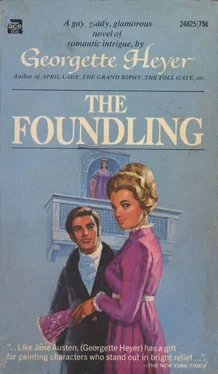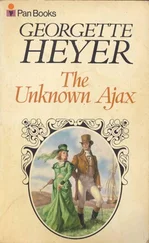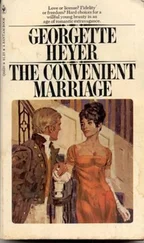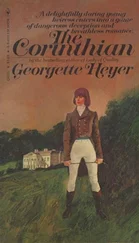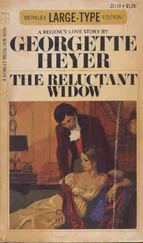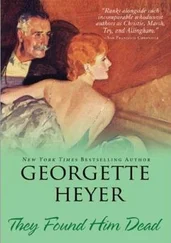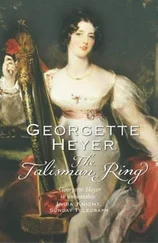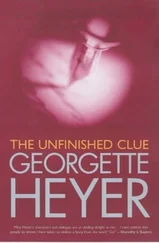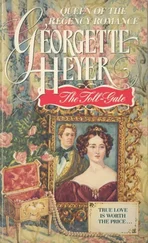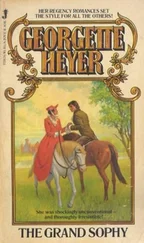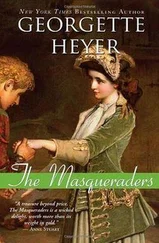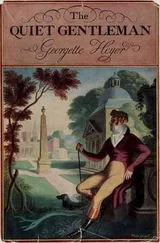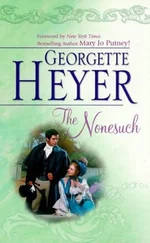“Pray do not let me have these odd humours!” begged his lordship irascibly. “One would suppose you do not attend to anything that is said to you, Sale! I have been telling you for ever that you are the head of the family, and must learn to take your place as such, and now you talk rubbishing stuff to me of your uncle’s not caring a button for your approval! If you are so lost to the sense of what is due to your position, you must perceive that he is not! A very pretty letter he has written you: expresses himself just as he ought! I must say, I had not thought he would have contrived such an eligible match for that girl—not but what it is not precisely what I should have cared for myself.”
“No,” agreed Gilly, taking his letter again. “My cousin is not yet seventeen, and I am sure Alfred Thirsk must be forty if he is a day.”
“Well, well, that need not signify!” said Lord Lionel. “The thing is that I have never fancied that brood of Yelverton’s. There is a damned vulgar streak in them all; came into the family when the old man—Yelverton’s father, I mean: you would not recall—married some rich Cit’s heiress. However, it is none of my business!”
The Duke said a little impishly: “Very true, sir, but if it is mine I think I should inform my uncle that I do not like the match. Poor Charlotte! I am sure she cannot wish for it!”
Lord Lionel audibly drew a breath. In the voice of one restraining himself with a strong effort, he said: “You will not, I trust, be guilty of such a piece of impertinence, Sale! Pray, what should a young man of your age know about the matter?”
“But you told me, sir, that I must learn to assert myself,” said the Duke meekly.
“Let me assure you, Gilly, that that kind of nonsense is beyond the line of being pleasing!” said Lord Lionel sternly. “You must be perfectly well aware that this very proper letter of your uncle’s is the merest formality, and not to be taken as an excuse for you to be putting yourself forward in a very unbecoming way! A fine state of affairs it would be if a man of your uncle’s age and experience is to be told how he is to manage his household by a young jackanapes of a nephew! You will write to him as I have directed, and mind you write it fair, and not in one of your scrawls! You had better let me see the letter before it is sealed.”
“Very well, sir,” said the Duke.
Perceiving that he had quite banished the smile from his nephew’s eyes, Lord, Lionel relented, saying in a kindlier tone: “There is no need to be cast into a fit of dejection because I am obliged to give you a scold, boy. There, we shall say no more about it. Give the letter to your aunt to read, and come into the library with me. I have something I wish to say to you.”
The Duke looked extremely apprehensive on hearing these ominous words, but he obediently handed over the letter to Lady Lionel, and followed his uncle downstairs to the library on the entrance floor. Since the candles had already been lit, and the fire made up, it was apparent to him that this interview had been premeditated. Insensibly, he braced himself to meet it with becoming fortitude, wishing that he dared light one of the cigarillos which his cousin Gideon had very reprehensively bestowed on him. But as Lord Lionel objected strongly to the vice of smoking, both on the score of itsbeing a vulgar, dirty habit, and of its being excessively injurious to the lungs, he did not dare.
“Sit down, Gilly!” said Lord Lionel, treading over to the fire, and taking up his favourite position before it.
This command was less unnerving than earlier ones (delivered in ferocious accents) to stand up straight and put his hands behind his back, but the prospect of having to sit in a low chair while his uncle loomed over him was almost equally daunting. The Duke’s apprehensive look deepened, and although he did sit down, it was with obvious reluctance.
Lord Lionel, who did not include the taking of snuff amongst the vulgar and dirty habits engendered by the use of tobacco, helped himself to a generous pinch, and shut his box with a snap. “You know, Gilly,” he said, “that letter of your uncle’s comes remarkably pat.”
The Duke’s eyes lifted quickly to his face. “Yes, sir?”
“Yes, my boy. You will be of full age in less than a year now, and it is high time we were thinking of settling your affairs comfortably.”
The Duke was aware of a sinking sensation in the pit of his stomach. He kept his eyes fixed on his uncle’s face. “Yes, sir?”
For once in his life, Lord Lionel seemed disinclined to come speedily to the point of his discourse. He opened his snuff-box again, and said: “I have always tried to do my best for you, boy, I daresay you may sometimes have thought me harsh—”
“Oh, no!” said the Duke faintly.
“Well, I am happy to hear you say so, for I am very fond of you, Gilly, and always have been. I have no scruple in telling you that apart from your health, and a want of spirits in you, you have never caused me anxiety.”
The Duke, feeling that a response was expected, stammered: “Th-thank you, sir!”
“I don’t say that you are as wise as I could wish,” said Lord Lionel, tempering his praise, “or that you have not a great many faults, but on the whole I fancy your poor father might have been not dissatisfied with his son, had he lived to see you today.” Here he took another pinch of snuff. As Gilly was unable to think of anything to say, an uneasy silence prevailed. Lord Lionel broke it. “Your father left you to my guardianship,” he said, “and I think I may say that I have in every way open to me followed out what I knew to be his wishes. I even had you christened Adolphus,” he added, a slight sense of grievance overcoming him, “although it is one of these new-fangled German names that I very much dislike. However, that was a small thing, and you know I have never called you by it. And I have never permitted your uncle Henry to interfere in your education, for all he has been one of your trustees. I have nothing to say against your uncle, and no doubt his notions do very well for his own sons, but they will not do for me, and they would not have done for your father either, and a thousand pities it was that his name should have been included in the Trust. But there is no sense in repining over that, and I hope I know how to deal with my own brother.”
The Duke, drawing upon his recollection, could not feel that this hope was misplaced, but he did not think himself called upon to say so. Instead he uttered an indistinguishable murmur.
“There is no reason why you should be treated like a child, Gilly,” said Lord Lionel, in a burst of candour, “so I shall not conceal from you that I have a very poor opinion of your uncle’s judgment! He does not want, precisely, for sense, but you must know that he never partook of your father’s and my sentiments as one could have wished he might have done, and when he married that foolish woman—but I do not wish to dwell upon that, and if he chose to ally himself with a female out of a canting Methodist family, and to breed a pack of ill-conditioned brats who can think of nothing better to do than to ruin a lawn it has taken fifty years to bring to perfection, I am sure it was not for me to cavil. Although, mind you,” he added admonishingly, “I told him how it would be at the outset. But Henry was never one to listen to those who might be supposed to be a little wiser than himself. I trust you will not turn out to be the same, Gilly.”
The Duke assured him that he would not.
“No, well, I fancy I have drilled a few proper notions into your head,” agreed his uncle. “But all this has nothing to do with what I have to say to you!” He bent his austere gaze upon Gilly’s downcast face, and was silent for a moment. “I am speaking of your marriage, Gilly,” he said abruptly.
Читать дальше
